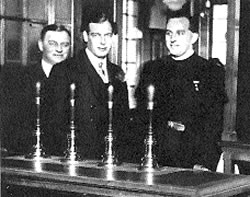 In place of our weekly blog, we bring you a sermon preached by our Director, Canon Dr Angus Ritchie, at Magdalen College, Oxford, for Pentecost. In it he covers the Holy Spirit, Social Justice and one of our heroes… Fr Basil Jellicoe.
In place of our weekly blog, we bring you a sermon preached by our Director, Canon Dr Angus Ritchie, at Magdalen College, Oxford, for Pentecost. In it he covers the Holy Spirit, Social Justice and one of our heroes… Fr Basil Jellicoe.
“Bishops are often told to stick to spiritual matters, and to stay out of politics and economics. Such advice is half right: the Church and its leaders certainly should focus on to spiritual matters. After all, that’s why Bishops get to wear such funny hats. The curious shape of the mitre is modelled on the flames of the Spirit that descended on the Apostles at Pentecost. They remind us that Bishops are “spiritual” leaders, and indeed that the mission of the whole Church is a “spiritual” one.
The problem comes when we assume that political and economic questions – the quality of people’s housing, the wages they are paid, the way a country treats refugees – are somehow not “spiritual” issues.
At first glance, some passages in the New Testament seem to justify a separation of these political and economic issues from more spiritual matters. Jesus talks about his Kingdom not being “of this world.” St Paul contrasts the things of the spirit and with the things of the flesh. So it is tempting to imagine that there is one set of things (spiritual and other-worldly) which are the business of the Church, and another set (the things of the flesh, and of this world) which are not.
In fact, the New Testament uses the words “flesh” and “world” in a more nuanced way. Sometimes the words do indeed have a negative connotation. But in other places, two same words have a much more positive meaning. In John’s Gospel, we read that in Jesus Christ the Word has become flesh and dwelt among us. Here, “flesh” could not be more spiritual – for in Christ, flesh bears the very life of God. Later, the Gospel tells us that “God so loved the world that he gave his only Son, that whoever believes in him shall not perish but have everlasting life.” In this sense, the “world” is not to be rejected but embraced. It is the object of God’s sacrificial love.
This ambiguity goes to the heart of the Biblical message. “The world” and “the flesh” are used to mean both good things given to us by God and the way they can become idols, distracting us from his life and love.
The Bible confronts us with a choice between two very different ways treating the material world God has given us. One way of living pursues physical pleasure and material gain to the exclusion of everything else. The Bible calls this idolatry. We make something an idol when we forget that it is a gift from God – when we live, in Paul’s terms, “according to the flesh.”
But living “according to the Spirit” involves treating the material world very differently. It involves recognising that the world around us is in fact a gift – that everything we have and everything we are has come to us by the grace and generosity of God. Christians believe the physical world is sacramental. That is to say, the physical world is a gift, and its purpose is to draw us into deeper fellowship with both God and neighbour.
We might put it this way: instead of being an idol which distracts us from God, the material world is meant to be an icon, something that draws us into God.
Perhaps the clearest statement of this comes in the First Letter of John:
No-one has ever seen God; [but] if we love one another, God abides in us and his love is perfected in us. By this we know that we abide in him and he in us, because he has given us of his own Spirit.
Here, we see what it means for our earthly love to be an icon. Care for the people we can see draws us, into the love of the God we cannot see. And such care has a very practical, economic dimension. As John says:
If anyone has the world’s goods and sees his brother in need, yet closes his heart against him, how does God’s love abide in him? Little children, let us not love in word or speech but in deed and in truth.
That’s why the OId Testament in particular has so much teaching about economics. That’s why the Gospels contain more verses in which Jesus teaches about how to use our possessions that about how to pray. We show the state of our spiritual life by the way we behave in this physical world. As the Letter of James puts it:
If a brother or sister is ill-clad and in lack of daily food, and one of you says to them, “Go in peace, be warmed and filled,” without giving them the things needed for the body, what does it profit? So faith by itself, if it has no works, is dead. But some one will say, “You have faith and I have works.” Show me your faith apart from your works, and I by my works will show you my faith.
So, far from dividing life into spiritual matters on the one side, and material ones (including politics and economics) on the other, the entire Bible holds them together.
In Genesis chapter 1 verse 2, it is the Holy Spirit who draws order from chaos in the creation of the world. The physical world is deeply spiritual – for it is through God’s Spirit that it has come into being! As we move on to the books of the Law, we are presented with a vision of political and economic life in which God’s people are commanded to treat the way the poorest in their community with generosity and with justice. In the same way, the vision of the Psalmist and of the Hebrew Prophets refuses to separate the spiritual and the material – again and again, love of God is shown in the very practical ways we treat our neighbours, and in particular the way wealth is produced and shared.
As we turn from the Old to the New Testament this theme, if anything, intensifies. We discover that the physical world can not only point to God, but that in the womb of Mary, God becomes flesh. In the power of the Holy Spirit, he is born and dwells among us. After Jesus’ Ascension, that same Spirit is poured out to the Church, so that we become his Body.
By that Spirit, Christ now takes flesh in the bread and wine of every Eucharist, and in the life and limbs of every Christian. As we heard this morning, the first fruit of the Spirit was a church which prayed, which broke bread together, and which shared its wealth so all had what they needed.
So how might we live this out today? What does it mean for our physical lives to embody and to share the life of the Spirit?
Fr Basil Jellicoe studied here in the early twentieth century. His story helps us to understand what it means for our material relationships to be deeply spiritual matters.
Fr Jellicoe was part of Magdalen College’s Mission to Somers Town – one of the poorest neighbourhoods in London, near to Euston Station. Jellicoe was horrified by the slums in which so many of his parishioners lived. He saw this squalor as a spiritual issue, describing the slums as “an outward and visible sign of an inward and spiritual disgrace.”
In saying that, Jellicoe was choosing his words carefully and deliberately. The Catechism of the Church of England taught that the Holy Communion was “an outward and visible sign of an inward and spiritual grace.” In the Eucharist, we see the physical world fulfilling its God-given purpose: enabling us to grow into deeper fellowship with him and with our neighbour. Jellicoe saw that the slums in Somers Town reflected an opposing reality: of the indifference of the rich and powerful, abandoning the poorest to disease, overcrowding and squalor. The slums of Somers Town were, for him, an anti-Sacrament – a sign of how far his society was from understanding and experiencing the life and love of God.
Jellicoe did not simply observe this injustice and condemn it: he set about working for concrete, physical transformation. His life and ministry illustrates the point I am trying to make. When the Holy Spirit is at work in someone’s life, the world around them begins to be transformed. The work of the Spirit leads to physical change – in Jellicoe’s case, it led to affordable, attractive homes that continue to bless people in one of London’s poorest neighbourhoods.
How do we follow Fr Jellicoe today? Churches in England’s poorest neighbourhoods are showing us the answer – working with those around them for a Living Wage, for an end to exploitative payday lending, and for more affordable housing. In the last ten years, almost 100 students have served on Jellicoe Internships, spending their summers working in these churches, helping them to be an active force for personal and social transformation. If you think that would be a good way to spend your summer, please do speak to me after the service.
Questions of social justice are not an add-on to the Christian faith. The story of Pentecost shows us that, when the Spirit is poured out, our material relationships are transformed.
Christian spirituality cannot be “other-worldly.” It is this world that the Holy Spirit brought into being; this world in which God became flesh; this world which God is drawing into his glorious new creation. Any truly Christian spirituality will ask how this world can help us share the life and love of God. We see the answer at every Eucharist – as bread and wine become the means by which we taste and see our risen Lord. But we also see the answer in the way Christians transform the communities around them – the very practical acts of generosity and justice by which the love of God takes flesh in every age.
Amen”



Leave a Comment